An Isan village life (3)
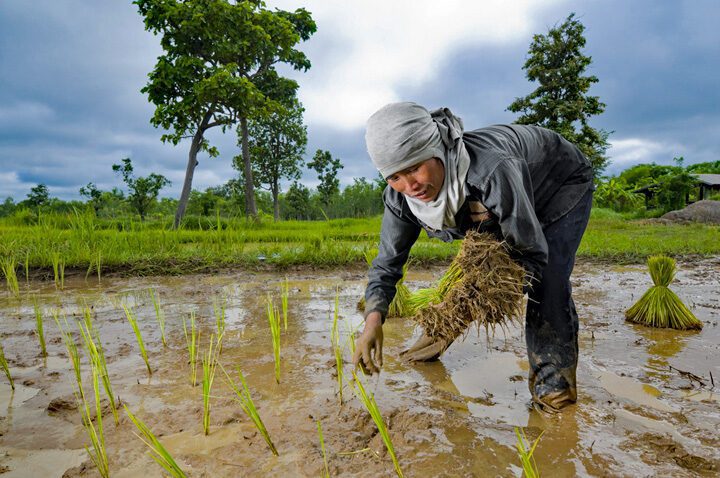
Many here are poor in money, but rich in land. Farmland that is, and therefore worth little, although they often build on it, especially if that piece of land is close to a is. Black street or track, that's what they call an asphalt road here. Land that is often also unsaleable, the must remain in the same name, which may only be passed on in the first-line family.
Fortunately, De Inquisitor was aware of this, because in the first years when he lived here, people came by quite often to offer land. Many rai's, dirt cheap. Sometimes a bit more expensive, but then there was a forest on it, the value of the wood is included in the price. Or was it a bit more expensive if that piece of land could be watered via nearby canals, two rice crops a year possible.
People also often came to ask for a loan, they continue to believe that every farang is a millionaire. They were sure they could get that loan because they offered the , the title deed, as collateral. But The Inquisitor also knew that you could not do anything with it, in case of which he could never sell the land. Besides, what can you do with that soil, thought The Inquisitor. He did not like to farm, his agricultural knowledge is minimal.
And now, five years later, he would have to grow rice. That is already the plan of love, because something had happened that was only whispered about at first.
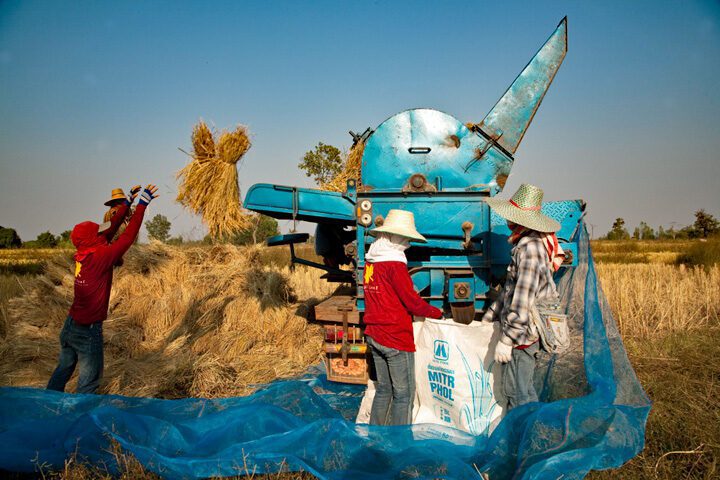
flydragon / Shutterstock.com
Her mother also has a lot of land, a lot. Spread over the village and surroundings as with everyone here. She had already donated a piece of cloth to her four children. The Inquisitor's house was built on top of that, and Piak's abode is one hundred and fifty meters away. The two other sisters' land is fallow, occasionally they tried to encourage Piak to have bananas or other fruit grown there, but that always ends in nothing, which later leaves the young plantations to wither. Did they lose their investment?
Most of the land was therefore leased after the death of the father, because only son Piak was already a ransom at the time and refused to work the fields. That tenant was a diligent fellow, because he grew rice on his own fields and on those leased lands. Did that neatly and always fulfilled the transfer correctly.
When Piak married, the lease was canceled - he would grow the rice himself.
Now the arrangement is the same as with the tenant before:
Piak has to give the sisters and mother the required amount after each harvest rice put aside what one needs to eat for a year, the rest is for him. He must therefore take his own share of it and he may sell the rest, which is his merit for the work he has done. However, the mother continues to support Piak heavily and takes care of the seed and manure every year. Now Piak is left with something, well, the rice hardly yields anything and all that hassle, but for two years he could collect twenty thousand baht each time. Everyone thought.
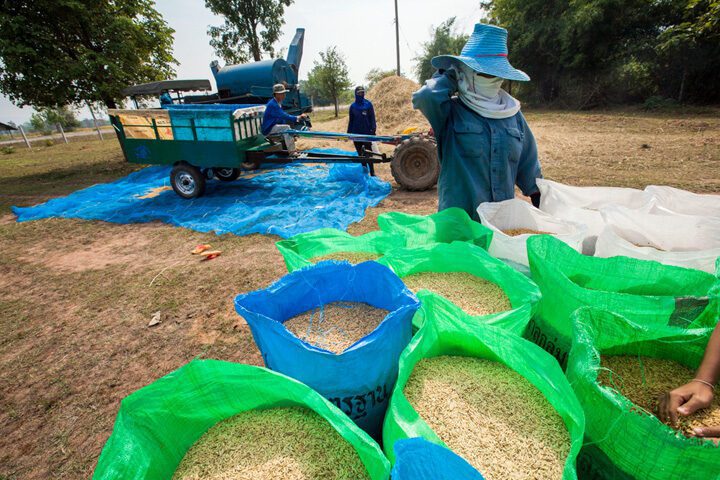
flydragon / Shutterstock.com
This year, both the love and the mother notice that there is not enough rice. Even before the start of the new season, so about half a year too early. That supply to eat is kept in a (storage house for the rice) next to mother's house and Piak is the man who has the key to it. When necessary, the sweetheart or the mother say she needs a bag of rice and this time the answer is that there is none.
The sweet can only report to De Inquisitor that rice has to be bought. Who is not from yesterday and asks for some explanation about it, by the way, he had already noticed that something was going on: secret conversations between the love and her mother that stopped every time The Inquisitor came near. Especially sweet knows that her tee rak is gradually understanding more than most think, he continues to play dumb, an old trick that also allowed him to learn a lot during his years near Pattaya. Moreover, De Inquisitor was aware of that agreement. And he should never have bought rice during all those years with that tenant and the first two years with Piak.
For the first time in a long time a somewhat bitter conversation with the love, although it is not even about a lot of money. The Inquisitor had long figured out that Piak messed around a bit and it's about the principle – you don't do that.
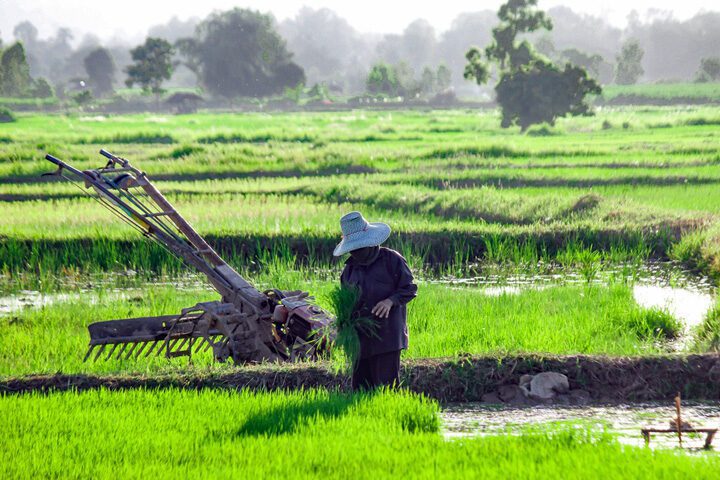
Piak, in a fit of greed and daring, has sold more rice than he was allowed. The love and her mother once again reacted very Isaan to it, they did not address Piak or call him to order. On the contrary, they leave the issue blue-blue. Also in resignation: what can you do about it, Piak has no money anyway.
That was not counted De Inquisitor who persists this time and refuses to buy rice.
This is not possible, if you do not respond, he will do it every year. And look, apparently a seed has been planted: they are starting to think about it. Of course they want to implement any measures in a roundabout way, loss of face must be avoided.
To Piak's surprise, the mother lets her simply moving in its entirety to his own home, she gives that as the reason that it is easier for him.
Piak satisfied until he hears the next measure. The mother will put part of the fields in the name of the sweet. And the sweet wants to grow rice on it itself. Here too, De Inquisitor thinks that this is rather ill-considered: what about the shop, is she going to close it for weeks?
'Little' is the vague answer, she wants to work with day laborers who have to prepare the fields mechanically, plant them and then harvest them. She wants to do the work in between herself. And there must be one built in our yard. Her harvest goes in there together with the part of mother that Piak will have to hand over.
They think the problem is neatly solved.
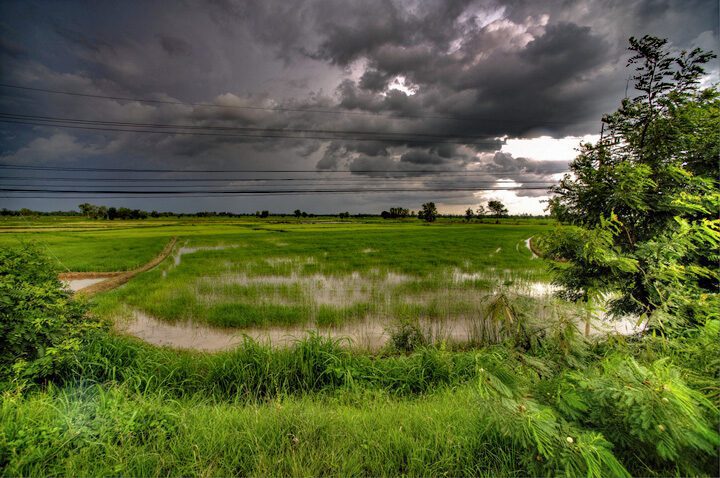
That is all quite something, argues De Inquisitor: of course he is expected to finance everything – the construction of a , the purchase of planting material and manure, the day laborers with their tractors. And the maintenance of the rice during growth can sometimes be setbacks in bad weather conditions: weeding is not easy and if the sweetheart wants to do it himself, the shop has to close for days. Will some kind of virus come in, should professional help be called in, finance again?
The Inquisitor wants to think about it first. The sweet does what she wants, of course, but De Inquisitor doesn't immediately like all those extra costs. Especially since he is not familiar with agricultural matters. You can estimate that, yield in kilograms per rai, but you are completely dependent on the weather conditions. Moreover, those fields have been intensively cultivated for years, what if they are no longer suitable and have to rest for a year or so? These are low-yield fields, with less yield than normal on average. Is that sale sufficient to pay back the investments made, let alone make a profit – after purchasing own use?
Moreover, De Inquisitor is someone who likes to keep control over his investments, but that is going to be difficult. For example, he will have to pay attention when purchasing the necessary items because, of course, Piak also needs them at the same time…. Will he have to be present to make sure everything is being done on the right fields: the fields of Piak and the sweet are criss-crossed: where are the day laborers and the machines at work? The Inquisitor will have to be present at the harvest, threshing and transport of the rice. Will he have to pay attention when selling the rice, keep an eye on weight and price.
Now he kindly understands. She thinks about her future. The Inquisitor does not live forever. Suppose he drops out in about fifteen years. Then it's sweet there fifty-four. Still too young, but what is she supposed to do at that age? The shop is not really enough to live on, it is close to minimum wage. She has experienced famine here in the region, moreover, own rice is a certainty for all people in Isaan. The only thing is the difference of approach.
Love goes straight through the sea: simply prepare the land, fertilize, sow, transplant and harvest. If only rice comes.
The Inquisitor is and will remain a Westerner: calculate investments and possible returns in advance, think about how to maintain control.
It is decided to go out together for a while. Charge the batteries and then there will be a solution. Moreover, the rainy season seems to be arriving early this year, promising because all the greenery is already shooting through. Only the rice fields.


After 2 years of investing and little or no work on the rice fields, we asked my wife's brother to do the rice fields. Now we receive enough rice as compensation to get through the year. Actually the arrangement you had! We now only have to put some money into the harvest festival and my wife helps to cook for the contractors. On balance, that is much cheaper for us because another brother was allowed to have the higher yield of our harvest for sale.
Good luck with your dilemma friend!!!
Why should a chanut stay in the family? I see here in Chiang mai that a lot of land is bought with a chanut. When there is a chanoot, every Thai can buy that land, right? And how would you know which chanoot should and should not stay in the family?
There are many types of 'land papers' and only the chanoot gives full ownership.
Unfortunately there are two 'title deeds' with the red garuda, but only one has the title chanoot. That does create confusion. Not all title deeds have the name 'chanoot', but they are sometimes confused.
What is meant here is a piece of land that has been bought or obtained by inheritance with the stipulation that it may only remain in the family in a direct line. That is not actually full ownership; there is also not always a plot with its own access to the public road.
Here it is explained:
https://www.siam-legal.com/realestate/thailand-title-deeds.php
If there is a 'land paper', go to the land register (thie din in Thai) and ask what that paper contains. It is indeed very confusing, even for most Thais.
Dear Erik, with regard to the last paragraph, I think there is a granted right of use. The land cannot be bought or sold but has been loaned to the family. So there is no ownership at all.
Nor Sor 3 Gor has a black Garuda, Nor Sor 3 a green one and the Chanoot a red garuda on the document. These 3 different documents represent real land ownership, all other documents do not. Why make it complicated, a chanoot is a chanoot and is therefore registered in the Land Office.
The article says chanut in brackets, so "read" something other than the real chanut which is freely tradable. There are other ownership documents for land on loan from the government. These can only be passed on within the family and must be the same family name. If the amphur or land office finds out that money is being requested after all, they will take the land back because it has been given on loan to grow something.
My wife and I live in Nong Prue near Pattaya. She also owns several rice fields (16 rai) in Isan. We have it edited by a brother of hers. All expenses and proceeds are for him. All we want is for him to deliver us rice when we run out of ours. He then does it in Roiet to the bus station and we pick it up in Pattaya. We are happy and he is happy.
A difficult choice, as you write, the soil may need a year of rest.
for a good yield.
The question is do the costs in advance and the additional work weigh up against the proceeds.
Last year we had to buy rice ourselves, which normally had enough and still had left over for sale. Too little rain fell in 2018, buying water too expensive.
the prospects for a lot of rain are also not favorable for this year , if the newspapers are to be believed .
My advice for what it's worth.
because of your loss of face, that you let someone look at the rice fields from outside
Which your wife gave under the table in advance for a fee from you,
advises to give the country a rest for a year
Problem solved for now
Advice back to the first tenant, just like you said yourself, you don't have time for it.
Put potatoes on it. 😉